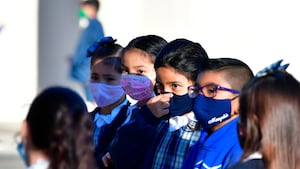A few weeks ago, I started asking a question at all of my appointments.
The actual reason I’m seeing the patient doesn’t matter. The child could be coming in for poison ivy, concern about a sprained ankle, or symptoms that resemble COVID-19. Whatever it is, I find the time to ask my patients’ parents one more thing.
I ask them if they’ve had a chance to get vaccinated against COVID themselves.
This might seem like an odd question to ask, given that I’m a pediatrician and these parents are not actually my patients. But I consider it my responsibility to support the wellbeing of the entire family. Every visit is an opportunity to check in about how they’re dealing with the most pressing public health problem our nation continues to face.
I practice in Massachusetts, which has one of the highest rates of vaccination in the country, so most of the responses I get are in the affirmative. Every time a parent tells me they’re fully vaccinated, or on their way, I do a little happy dance. (Literally.) It hasn’t gotten any less joyful for me to learn that one more member of a family I care about has gotten protected.
When a parent tells me they haven’t gotten vaccinated yet, the replies tend to fall into one of three categories.
Some parents say they plan to get vaccinated, but it just hasn’t felt like a priority. Lack of childcare, either to go get the vaccine or to watch kids if the parents need a day to recover from side effects afterward, has been a serious barrier for some of my patients’ families. I’m thrilled that I’ll be able to tell them about a new campaign to provide free childcare to those who need it in order to get vaccinated.
For parents who simply haven’t gotten around to it yet, I offer encouragement to make it happen, and help them find convenient vaccination sites if they need it.
On the other end of the spectrum, some parents flatly say they aren’t going to get it. I don’t really inquire much when it’s clear someone just doesn’t think they need it. I learned long ago that it’s extremely difficult to dissuade someone once they’ve decided against vaccines. I know it will only waste everyone’s time to press the issue, so I change the subject.
And then there are the parents who can tell me the reasons why they’re worried about getting the vaccine. Very often, the concern is about how rapidly the vaccines were developed. Sometimes, it’s some specific bit of misinformation they’ve seen on social media or receive through word of mouth.
For those parents, I have all the time in the world. And I tell them so.
I make a point of saying a couple of things every time I have these conversations. I start by telling parents my goal is not to pressure them to make a decision they’re not ready for, but to give them some information that might help them feel more comfortable getting vaccinated at some point in the future. And I tell them that their health is important to me, not only because they are parents of my patients, but for their own sake. Their protection matters.
If the speed with which the vaccines were developed is the hang-up, I talk about the decades of research that allowed the vaccines to be created with relative speed. I discuss how the mRNA vaccines actually work, and how safe their mechanism of action makes them. And I say outright that there is no plausible way any of the nonsense claims about the vaccines could be true.
I wrap it up by telling them how much I want them to be able to safely return to all the things their lives have been missing for over a year now. Getting the things they love back, whatever those things may be, is what being vaccinated can give them.
I have these conversations as kindly and respectfully as I can. And, knocking on wood, they’ve all been received that way, too.
Since I started asking parents about being vaccinated, several have been back to the office for one reason or another, and have told me the conversation I had with them was what made the difference in going ahead with vaccination. One parent told me that not only had their spouse gotten vaccinated after talking with me, but they talked with their friends, who got vaccinated, too.
I cannot tell you how much it means to me to hear that.
Obviously, our elected leaders and prominent public health experts can reach a larger audience than I can, and have the weight of their offices or institutions behind the recommendations that they make. But for people who don’t find those authorities convincing, especially after four years of an administration that plainly cared about neither science nor competent policy, sometimes medical providers like me can make the case more effectively.
I’ve been at my current practice for over ten years. During that time, parents who bring their kids to me have been able to see how important their children’s health is to me, and how meaningful it is to me to be a part of their families’ lives. I care a lot about them, and they know it. Knowing that I care goes a long way for some people who need to hear on a more personal level—as opposed to from a president they may not have voted for, or an official on television—why the vaccine is the right thing for them.
The COVID pandemic has been the biggest public health problem the world has had to solve in my lifetime. It has required massive measures on the part of governments spanning the globe, and the diligence and brilliance of innumerable scientists. Huge challenges demand huge solutions.
But even small steps toward a safer, healthier return to the lives we’ve missed make a difference. I’m grateful to be helping a few people take them.







